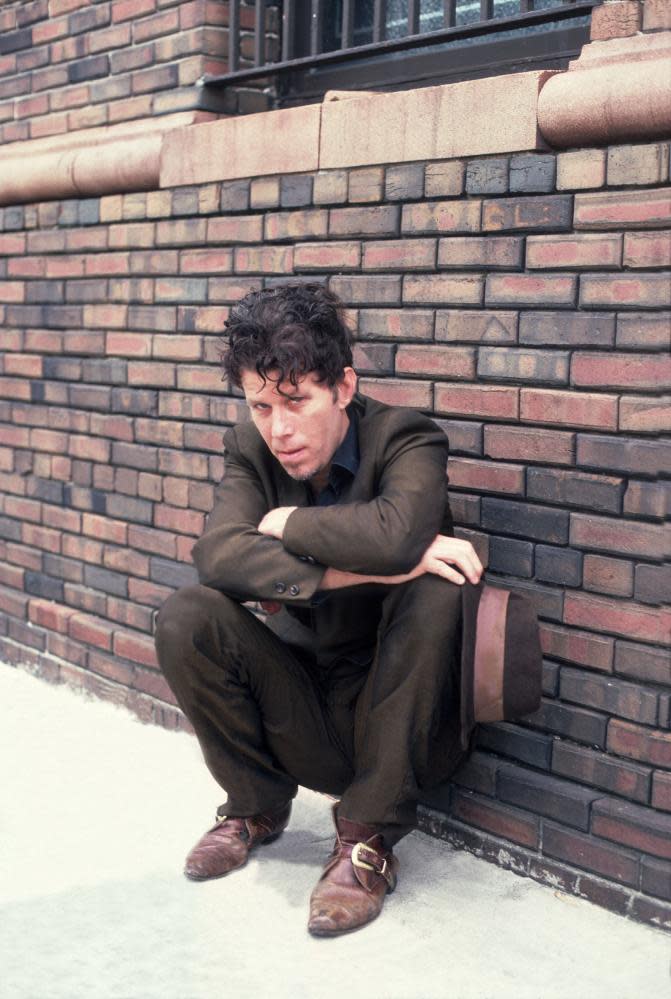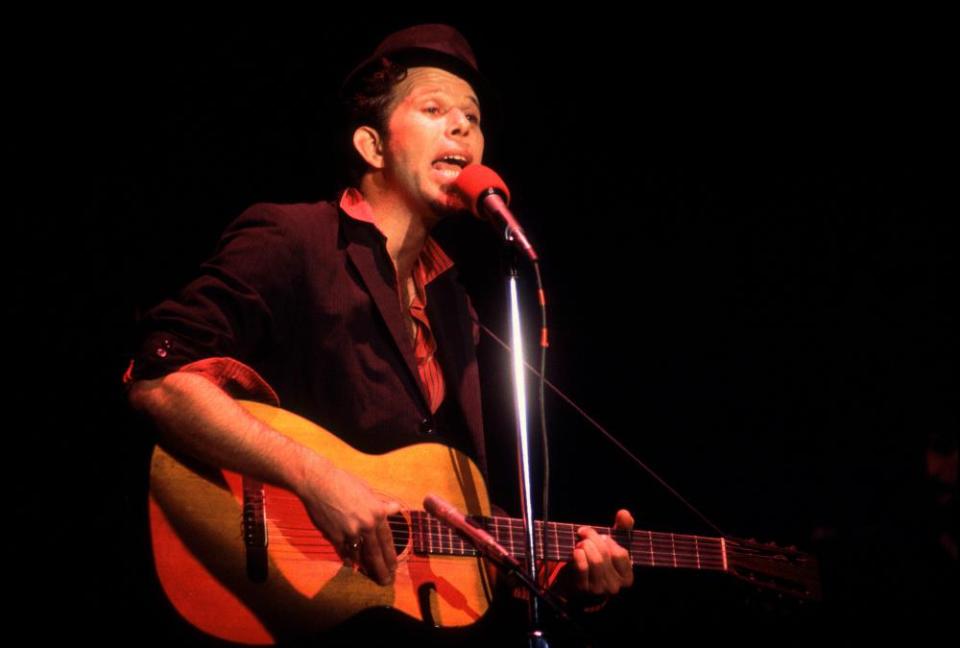‘All these bulletproof songs, one after another’: remembering Tom Waits’s extraordinary mid-career trilogy
On Tom Waits’s 1983 album, Swordfishtrombones, there is, in among a lot of fabulously unhinged musical experimentation (Tony Bennett described the record as “a guy in an ashcan sending messages”), a 90-second ballad of such tender beauty that it explains all the rest. The song was written for Waits’s wife, Kathleen Brennan – “She’s my only true love/ She’s all that I think of, look here/In my wallet/That’s her” – and named after the town, Johnsburg, Illinois, in which Brennan grew up. The pair had got together on the set of Francis Ford Coppola’s 1981 film One from the Heart, for which Waits was writing the music and Brennan editing the script, and had married a couple of months later at 1am at the 24-hour Always Forever Yours Wedding Chapel in Los Angeles.
The union liberated Waits from what may have appeared his inevitable fate: of the ultimate bar-room balladeer who descends into dissolution and obscurity. The singer had spent the first decade or so of his career toying with that possibility, living partly in the Tropicana motel on Sunset Boulevard, or in his car, a 1955 Buick, writing and singing about dereliction and doomed love, and playing up to a reputation for “wasted and wounded” chaos. For the first time, having met Brennan, he said: “I now believe in happy endings.” The experimentation of Swordfishtrombones was the first expression of that faith. “My life was getting more settled,” Waits recalled. “I was staying out of bars. But my work was becoming more scary.”
An entire universe [was] revealed to me for a few minutes
Thom Yorke
It was Brennan who gave Waits the courage to retire some of the seductive “piano has been drinking” myths of his own creation and to follow his restless musical intelligence, wherever it might take him. That album came out not long before the arrival of their first child. Two more albums (and two more children) followed in quick succession in the mid-1980s, Rain Dogs and Franks Wild Years. These are records of startling originality and playfulness, of cacophonous discord and sudden heartbreaking melody, in which it seemed the artist was trying to incorporate the whole history of American song into his loose-limbed poetic storytelling. To mark the 40th anniversary of Swordfishtrombones, that trilogy of albums has been remastered and will be rereleased next month.
Over the past week or so I’ve been talking to a few of the people who played on those remarkable records, and a few of the many listeners on whom they had an astonishing effect first time around (what Radiohead’s Thom Yorke calls that sense of having “an entire universe revealed to me for a few minutes only to drop me at the other end of the block [with] no idea how I’d got there”). To find the sounds he was looking for, the singer assembled around him a fearless collection of virtuoso musicians – the guitarists alone included Keith Richards and Marc Ribot. As Waits once told me in an interview, his band were required to do more than just keep up. “It’s like Charlemagne or one of those old guys said,” he noted. “You want soldiers who, when they get to a river after a long march, don’t start rooting for their canteen in their pack, but just dive right in.”
For the second album of his trilogy, Rain Dogs, Waits and Brennan had moved from the west coast to New York, into a loft apartment in Little Spain, not far from Union Square, which Waits furnished with stuff he found on the streets. He was, he said at the time, completely overwhelmed with the immersive noise and talk of the city. “For the most part it’s like an aquarium,” he told one interviewer. “Words are everywhere. You look out of the window and there’s a thousand words.” That clamour of found poetry made its way into his songs, just as the skip-reclaimed furniture found its way into the apartment. He had a sense, he told David Letterman at the time, that living in lower Manhattan was like “being aboard a sinking ship. And the ocean is on fire.” That feeling ran through Rain Dogs (the name is a reference to the city’s rough sleepers, “people who sleep in doorways… who don’t have credit cards… who fly in this whole plane by the seat of their pants”).
Marc Ribot recalled last week the first day of recording. “We were in the old RCA Studios, which harkens back to a time when the labels owned studios,” he said. “This was a historic place, high ceilings, wood panels, a huge room, which could record an orchestra; we set up in a clump in the middle. There was a lot of amazing old equipment and amplifiers from something called the guitar society and a lot of unusual instruments.”
To loosen up his sound, Waits had mostly abandoned his go-to saxophone and double bass, filling the gap with all kinds of percussion and drums, marimbas and harmoniums and squeeze boxes. At the precise moment when music was becoming synthesised and digitised and sampled, he insisted on its traditions of heavy lifting. (“Anyone who has ever played a piano,” he liked to say, “would really like to hear how it sounds when dropped from a 12th-floor window.”)
He became interested in reviving the legacy of Harry Partch, who in the 30s and 40s had lived a hobo life in America, travelling in box cars, picking up ideas for instruments from junkyard materials, even creating his own form of notation. “I use things we hear around us all the time,” Waits said, “…dragging a chair across the floor, or hitting the side of a locker real hard with a two by four, a brake drum with a real imperfection, a police bullhorn… the problem is that most instruments are square and music is always round.” Keith Richards has recalled how when he arrived in the studio he thought: “Hello! He had a Mellotron… which was loaded entirely with train noises.”
“Tom spent the previous couple of years in New York, researching what a lot of downtown composers and avant-whatever musicians were doing,” Ribot recalls. “I think he was working with a really wide palette – but it wasn’t just to be weird. The key to Tom’s music is that he’s dealing not only with a lot of different music of the past, but with our memory of those musicians. We hear the music of the past on old scratchy records. He had this bass marimba because he was interested in a lot of Caribbean sounds, but specifically the way they sounded on 1920s and 1930s recordings rather than on today’s technology. He was interested in the whole history of folk and blues, but also a wider kind of Americana beyond that.”

Waits was writing through the night in an artist’s community building in Greenwich Village (he used to get home at 5am, just in time to feed his baby daughter). “There were tiny little rooms and each one had a piano in it,” he later recalled. “You could hear opera, you could hear jazz guys, you could hear hip-hop guys. And it all filtered through the wall.”
If the departure lounge for this new sound had been Swordfishtrombones, then the real disembarkation was its successor, Rain Dogs. That album opened with a sort of frenzy of dockside rhythm, press-ganging the band and the listener into places they might not have been before. “We sail tonight for Singapore,” Waits rumbled over the cacophony in his most guttural voice, and you didn’t for a moment doubt him. The voyage then took you to all manner of destinations.
Michael Blair, who later played with Lou Reed and Elvis Costello, provided percussion on the album. “For a multi-percussion player, it was like: pinch me, please. You know, how many times in your life would anyone ever get a chance to play with somebody who wrote so well, all these bulletproof songs, one after another. They could all really be pop songs, if you arranged them in a different way. Or if the singer had a different type of voice.”
Waits, he recalls, would never be specific about what he wanted; it would be “play like a Russian barmitzvah, or Alice in Wonderland”. “You didn’t say, ‘What does that mean, Tom?’ – you just went for it. I think when something began to sound like the song he wrote in his mind, that’s where we started.”
Ribot remembers how Waits would often be writing the lyrics moments before he sang them. “The groove was the main thing, which he would keep trying to communicate with the way he was moving his body and guitar.” As Richards recently said in an interview with Uncut: “[Tom] had a lot of rhythms going on in his head and in his body… the groove is another word for the grail. People search for it everywhere, and when you find it you hang on to it.”
“I think what a lot of people trying to sound like Tom Waits didn’t get,” Blair says, “is that for that ‘junkyard’ sound to work, you’ve got to first have a song that will stand up to having an axe taken to it.” Just when his tracks become most alarming, Waits would remind you of their haunting structure, like Picasso reminding you he could still draw like an old master if he wanted to.
Waits mythology has it that the original beat of the opening track of Rain Dogs, Singapore, was provided by Blair, the classically trained percussion maestro, whacking a cupboard with a hammer. Is that true?
Blair laughs. “It is actually. We had this sort of Kurt Weill accordion and oompah sound, and Tom wanted to give a sense that the world is going to fall apart. We had a look around the studio, in the kitchen and the bathroom, wondering what might give that sound, of someone trying to break the door down. There was an old dresser in one of the storage rooms. All the way through it’s me with a real hammer bashing it. We could have sampled it, I suppose, but it would not have been the same.”

The New York Times named Rain Dogs the best album of 1985, and though sales in America were slow, Waits was beginning to find a new audience in Europe. The subsequent tour – which like all of Waits’s sporadic tours ever since have been the hottest ticket in any city – proved that he was sailing in the right direction.
Waits once recalled to the journalist Barney Hoskyns how, before he made Swordfishtrombones, he had a terrible nightmare. He was in a Salvation Army store and flipping through a stack of old vinyl records when he came upon one of his early singer-songwriter efforts. “The sleeve,” Hoskyns related, “stared at him reproachfully and he knew something had to change. He had to create something unique, ‘something you’d want to keep’.” Forty years on, still married to Brennan, living somewhat reclusively on a smallholding farm where they write and create together – “I wash, and she dries” is how he describes it – he is seeing that ambition come true.
* * *
Tom Waits’s famous fans on the Frank trilogy
Thom Yorke
Radiohead singer and musician
I think I was 17 when Rain Dogs came out. I bought the cassette and gazed at the weird guy held by his mother [on the cover] wondering what the fuck that was about. That cassette had a magic I couldn’t figure out… and I got more and more sucked in; it crept deep into my subconscious.
I remember falling asleep listening to it on my Walkman, only to wake up in the morning with it still on autorepeat in my head. Every track was a short movie set in a mysterious, circus-like down-at-heel America that I had almost no understanding of, with different characters both in the lyrics and the instruments, an entire universe revealed to me for a few minutes only to drop me at the other end of the block – no idea how I’d got there.
Every lyric was an effortless rhyme you could only dream of ever writing. Falling off the tongue so beautifully, but never giving easily, keeping half the story to itself. Waits was playing a character with a darkness and humour that felt far more genuine than anything trying to be, I dunno, genuine in 1985. But what really got to me more than anything was the feeling, when you listened to each song, that you were literally standing next to Tom Waits as he sang. Something about the way they placed the microphones in the room. You could feel the musicians scratching, blowing and beating this world into existence right next to you (and oh my god those weird guitar lines!) with an energy and spontaneity as if they had only just figured it out.
This record has never got tired for me, though I have played it over and over throughout my life, as did my kids growing up. This new mastering has brought all those feelings back to me, back to now, as if it had just been released.
Jeff Bridges
Actor
I’ve always loved Tom and he I acted together in The Fisher King, and in a movie called Cold Feet, which my wife produced. It was remarkable for me – as an actor – to witness these kinds of personas that he created; you think of musicians like David Bowie who could create these characters, and Tom could do all that, and just move in and out of them. He was so committed to performance all the time. You went to a Tom Waits concert and it was like nothing else you ever saw. Just after this period, in 1992, I made a movie called American Heart and we needed a theme song, and Tom gave us a wonderful tune called Never Let Go. When I was out playing with my band the Abiders one night some years later, we played that song, and – I’m glad I didn’t know – but Tom was in the audience. I saw him afterwards, and he was so generous and open and warm and hilarious. That’s all there in the songs.

Ian Rankin
Novelist
I already knew Tom Waits’s music, those soulful communications from the louche underbelly of the American dream, but nothing had prepared me for Swordfishtrombones. I first heard it on a friend’s stereo system, the pair of us transfixed by what was happening in front of our ears. It felt to me as if a vaudeville show was taking place in a scrapyard, the music whirling and clanging, Waits presiding over it all like a bruised but keen-eyed master of ceremonies. Rain Dogs added extra textures and refinements, laying its (marked) cards on the table with its opening track, Singapore, a novel contained within two and a half minutes of controlled musical mayhem. By the time of its release I had left university and was trying to shape myself into a writer. I admired Waits’s lyrical vision and concision – the man was a born storyteller, stopping travellers who had wandered into the wrong part of town and compelling them with his words.
Jim Jarmusch
Film director
I met Tom in 1984 just after Swordfishtrombones came along and everything opened up. He was invigorated by New York, and obviously his wife Kathleen was a big part of that change. When I cast him in Down By Law, there was no trepidation. Some musicians are just very good at translating into character and Tom is one of the best of those.
He knows about a lot of different things in the world, but songs are his religion. On those records he is a blender and bender of genres: R&B and blues and ballads and spoken word and Stockhausen and jazz, Kurt Weill, Louis Armstrong, Serge Gainsbourg and death metal. He has a very experimental side. He showed me this instrument that he made that runs tape loops using bicycle chains. He subscribes to a newsletter of people who make their own one-off instruments and corresponds under one pseudonym or another. I heard him doing his voice exercises once, which was kind of hilarious. I have always seen Kathleen as a reliable kind of navigator, but she is always taking the ship further out into space. What they have is not going to get broken, not in this lifetime at least.
Jim Sclavunos
Musician (Sonic Youth; Nick Cave & the Bad Seeds) and producer
For the better part of a year after its release, Franks Wild Years was the nightly go-to pump-up album for me and my roommate. Gussying ourselves up to war-song strains of Temptation, Straight to the Top etc was an essential part of our ritual of getting ourselves “in the mood” before emerging from the squalor of our Lower East Side tenement, ready to take on the world and however many bottles of Rolling Rock beer we could get down our necks. Swordfishtrombones was a bombshell to say the least. That an artist with a gift for writing tunes so evocative of memories real and imagined would decisively rend the fabric of his well-established image, and trade in coolly louche atmospherics for neon-lit junkyard sonic grotesquery was a perverse strategy that I couldn’t help admiring. These no-holds-barred albums set the stage for the years of innovation upon innovation that followed.
Island Records/Universal Music will release remastered versions of Swordfishtrombones, Rain Dogs and Franks Wild Years on 1 September, with Bone Machine and The Black Rider to follow on 6 October

 Yahoo News
Yahoo News 
